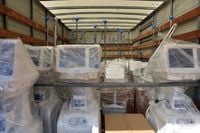In a startling revelation, a recent audit by the State Audit Office has uncovered that a staggering 32 percent of the expensive medical equipment purchased for public health is either underutilized or gathering dust in basements. This inefficiency comes despite an investment of 21.8 million euros in advanced medical technology, with equipment worth 13 million euros completely unused and an additional 5.5 million euros worth not being utilized to its full capacity.
The audit, which covers a three-year period from 2021 to 2023, highlights significant issues in the operational readiness of essential medical devices, primarily due to a lack of professional staff and inadequate spatial conditions. The report specifically notes that five linear accelerators, critical for cancer treatment, have not been put into operation. Two of these machines are located at the Clinic for Radiotherapy and Oncology, while the others are situated at Clinical Hospitals in Shtip and Bitola, and one at GOB '8 September' in Skopje. Alarmingly, some of this equipment has been installed for several years but remains inactive.
As a result of this unpreparedness, the Clinic for Radiotherapy and Oncology has become the sole provider of radiotherapy services in the region, treating over 2,300 patients annually and conducting an average of 200 treatments per day. This centralization has led to an overwhelming burden on the clinic, raising concerns about the quality and continuity of patient care. The report states, "The centralization of services leads to overload of institutions and personnel, which can affect the continuity and quality of patient treatment."
Moreover, the audit reveals that 18 angiographs purchased in 2021, at a cost of nearly 13 million euros, are also underutilized. The insufficient use of these devices stems from a persistent shortage of qualified medical personnel and inadequate facilities. Despite a 68% increase in angiographic examinations compared to 2021, the demand for procedures such as CT scans, angiography, mammography, and PET scans cannot be fully met due to declining staff numbers.
In response to the audit's findings, Sasho Klekovski, Director of the Health Insurance Fund (FZO), acknowledged the issues stemming from years of unplanned procurement of medical equipment. He emphasized the need for better planning in future equipment acquisitions to ensure that the necessary human and technical resources are in place for optimal use. "Better planning is needed when procuring equipment with human and technical resources for the equipment to be used," Klekovski stated.
Despite the investment in advanced medical technology, the actual utilization of this equipment remains far from satisfactory. The audit indicates that without immediate solutions to staffing and spatial constraints, this expensive equipment will continue to serve as little more than a costly statistic, failing to provide the intended benefits for patients.
In addition to the issues surrounding the linear accelerators and angiographs, the audit also highlighted problems with computer tomography machines. Two such machines located in Tetovo and Kochani have not been put into operation, while others in various hospitals are either overburdened or have become outdated and fully amortized.
Furthermore, the report points out that the only PET Center, which is crucial for early detection of malignant diseases, is not utilizing its equipment effectively. Patients are reportedly waiting months for appointments, with only one PET/CT scanner currently operational, resulting in underutilization of the Cyclotron's capabilities, which could produce isotopes for a larger number of scans.
The audit also raises concerns about the absence of accurate data regarding the use of a nearly one million euro robotic device acquired by the Clinic for Physical Medicine. Irregularities were reported concerning services billed to the health fund and unpaid participation fees totaling nearly 250,000 euros.
As the findings of the audit continue to reverberate through the healthcare system, the implications are clear: the inefficiencies in the management and utilization of medical equipment not only waste valuable resources but also jeopardize patient care. The report's conclusion emphasizes the urgency of addressing these staffing and spatial limitations to transform these investments into tangible benefits for patients in need.
In summary, the State Audit Office's report underscores a critical need for systemic reform in the management of medical equipment within public health institutions. As healthcare continues to evolve, ensuring that investments translate into effective patient care remains paramount. Without decisive action, the potential of these millions of euros in medical equipment may never be realized, leaving patients to grapple with inadequate services and long waiting times.




